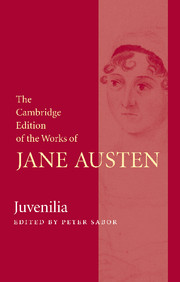Book contents
- Frontmatter
- Contents
- General editor’s preface
- Acknowledgements
- Chronology
- Introduction
- Note on the text
- Volume the First
- Volume the Second
- Volume the Third
- Corrections and emendations
- Appendix A The History of England: facsimile
- Appendix B Marginalia in Oliver Goldsmith’s The History of England, from the Earliest Times to the Death of George II
- Appendix C Marginalia in Vicesimus Knox’s Elegant Extracts . . . in Prose
- Appendix D Sophia Sentiment’s letter in The Loiterer, 28 March 1789
- Appendix E Continuations of ‘Evelyn’ and ‘Catharine’ by James Edward Austen and Anna Lefroy
- Abbreviations
- Explanatory Notes
The Generous Curate
Published online by Cambridge University Press: 18 December 2020
- Frontmatter
- Contents
- General editor’s preface
- Acknowledgements
- Chronology
- Introduction
- Note on the text
- Volume the First
- Volume the Second
- Volume the Third
- Corrections and emendations
- Appendix A The History of England: facsimile
- Appendix B Marginalia in Oliver Goldsmith’s The History of England, from the Earliest Times to the Death of George II
- Appendix C Marginalia in Vicesimus Knox’s Elegant Extracts . . . in Prose
- Appendix D Sophia Sentiment’s letter in The Loiterer, 28 March 1789
- Appendix E Continuations of ‘Evelyn’ and ‘Catharine’ by James Edward Austen and Anna Lefroy
- Abbreviations
- Explanatory Notes
Summary
a moral Tale, setting forth the Advantages of being Generous and a Curate.
In a part little known of the County of Warwick, a very worthy Clergyman lately resided. The income of his living which amounted to about two hundred pound, and the interest of his Wife's fortune which was nothing at all, was entirely sufficient for the Wants and Wishes of a Family who neither wanted or wished for anything beyond what their income afforded them. Mr Williams had been in possession of his living above twenty Years, when this history commences, and his Marriage which had taken place soon after his presentation to it, had made him the father of six very fine Children. The eldest had been placed at the Royal Academy for Seamen at Portsmouth when about thirteen years old, and from thence had been discharged on board of one of the Vessels of a small fleet destined for Newfoundland, where his promising and amiable disposition had procured him many freinds among the Natives, and from whence he regularly sent home a large New foundland Dog every Month to his family. The second, who was also a Son had been adopted by a neighbouring Clergyman with the intention of educating him at his own expence, which would have been a very desirable Circumstance had the Gentleman's fortune been equal to his generosity, but as he had nothing to support himself and a very large family but a Curacy of fifty pound a year, Young Williams knew nothing more at the age of 18 than what a twopenny Dame's School in the village could teach him. His Character however was perfectly amiable though his genius might be cramped, and he was addicted to no vice, or ever guilty of any fault beyond what his age and situation rendered perfectly excusable. He had indeed sometimes been detected in flinging Stones at a Duck or putting brickbats into his Benefactor's bed; but these innocent efforts of wit were considered by that good Man rather as the effects of a lively imagination, than of anything bad in his Nature, and if any punishment were decreed for the offence it was in general no greater than that the Culprit should pick up the Stones or take the brickbats away.
- Type
- Chapter
- Information
- Juvenilia , pp. 94 - 95Publisher: Cambridge University PressPrint publication year: 2006

